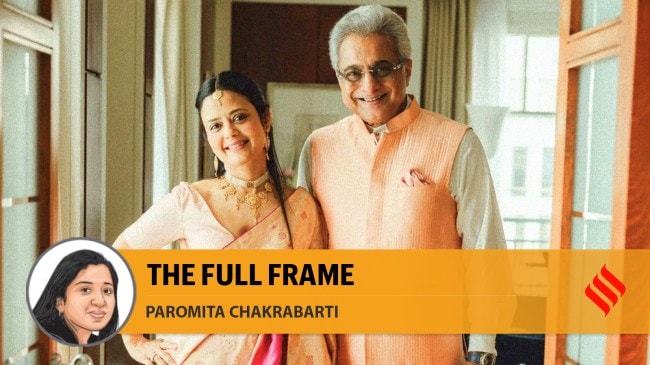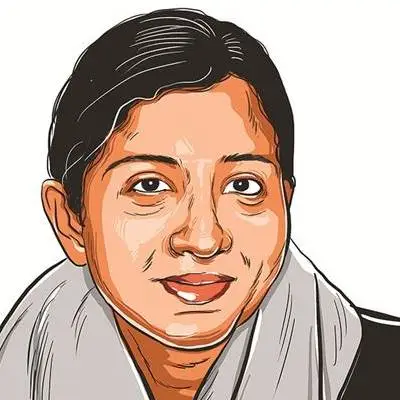Opinion Here’s to Mahua Moitra and other difficult women— may they remain fierce, unfiltered, in charge of their stories
In sharing photos of her private wedding celebration on social media, Moitra sent out the message that she will not edit herself to fit into anyone else’s frame
 For a woman politician, every choice becomes a referendum on her character. This double standard doesn’t merely tilt the scales, it builds imbalance into its structure. (Express Photo)
For a woman politician, every choice becomes a referendum on her character. This double standard doesn’t merely tilt the scales, it builds imbalance into its structure. (Express Photo) In a country where women in public life are expected to be circumspect about personal milestones — especially those that might provoke commentary — Mahua Moitra did the opposite. By sharing vignettes from her private wedding with fellow politician Pinaki Misra of the BJD in Berlin on social media, the 50-year-old Trinamool Congress MP made it clear that she will not edit herself to fit into anyone else’s frame.
In Indian politics, where women often shrink themselves into acceptability, even a simple act such as this can seem radical. Moitra has been at the receiving end of misogynistic trolling in the not-so-distant past. Her personal life, her choice in men (“terrible,” she had confessed in an interview to The Guardian in November 2023), her wardrobe — none of it has been off limits. In October 2023, following cash-for-query allegations, Moitra was hauled before the Lok Sabha Ethics Committee. The complaint against her, raised by BJP MP Nishikant Dubey, was grounded in documents received from Jai Anant Dehadrai, Moitra’s former partner. The tone of the inquiry that followed was heavy with moral judgement, light on due process. When she stormed out of one of the hearings, refusing to legitimise what she called a “kangaroo court”, Moitra was swiftly expelled, dismissed as uncooperative, arrogant, and that lazy shorthand for women who defy labels — difficult.
To be “difficult” as a woman is often to carry the weight of collective discomfort with female autonomy. It is an idea at odds with the culture of conformism that most women are raised in, with the ecosystem that demands compliance over confrontation. And so, when a woman refuses to bend, it is easier to seek her dismissal as unreasonable, hysterical, deracinated, even dangerous. As British writer Rebecca West put it over a century ago: “I only know that people call me a feminist whenever I express sentiments that differentiate me from a doormat, or a prostitute.”
Since 2009, when she gave up her job as an investment banker to enter politics, Moitra has refused to trade her sharpness for likeability. Terming her expulsion from Parliament “the most tenacious witch-hunt of a woman MP” and a “weaponisation of Parliament” committees, she declared that she would continue to fight the BJP “inside Parliament, outside Parliament, in the gutter or on the streets”.
This defiance does not, of course, elevate Moitra to a pedestal. What it does achieve, however, is to make her less of a cliche, all distinguishing features and sharp angles sanded down to perfect conformity. In the same Guardian interview, Moitra had said, “I’m not going to make excuses for who I am. I am not going to change who I am to fit the paradigm. Let the paradigm shift with me. When I returned to India to enter politics, I was clear that I wanted to be in public life, but by being myself.” Moitra’s refusal to be written out of her own story is what makes her interesting — and, often, such a challenge to the status quo. In her defiance, she offers an alternative to women who are told that their dignity depends on how little space they take up.
From M Karunanidhi to George Fernandes to Atal Bihari Vajpayee, Indian politics is replete with instances of male politicians with complicated personal lives that have barely caused a ripple in public discourse. Their romantic entanglements are seen as footnotes, not defining traits of a public servant. But for a woman politician, every choice becomes a referendum on her character. This double standard doesn’t merely tilt the scales, it builds imbalance into its structure. What Moitra has demanded is what every woman, including those in public life, deserves: The right to be judged by her politics, not her presence; the right to be messy, to love badly, to choose again, to own her story — privileges her male colleagues inherit without question.
Months after her very public expulsion, Moitra returned to Parliament after winning her seat from the Krishnanagar constituency in the 2024 Lok Sabha elections. To attribute her victory to any one reason would be reductive. But it indicates that Indian politics — in which nari shakti has become an affirmative slogan and women’s representation is set for a boost after the Women’s Reservation Bill — might need to make room for the difficult woman. The one who can forge connections while being herself; who doesn’t apologise for her ambition or affection, who demands to be held to the same standards as her male peers.
Here’s to Moitra then — fierce, unfiltered, on to a new beginning. Long may she remain difficult.
paromita.chakrabarti@expressindia.com



